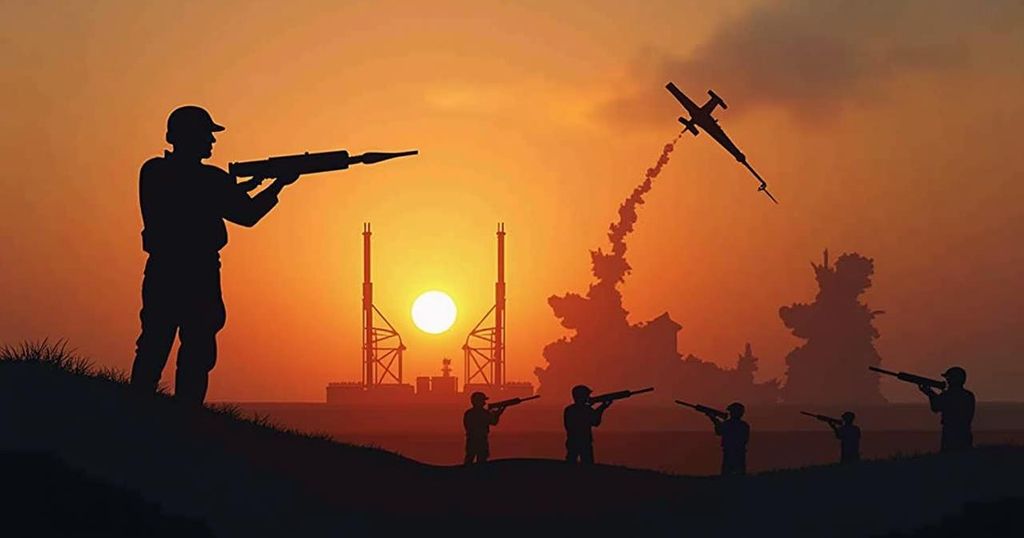How Israel’s Response to Iranian Missile Strikes May Transform Regional Politics

Approximately 200 missiles were launched by Iran at Israeli military targets, marking a significant escalation in the Iran-Israel conflict. Analysts suggest these strikes are a gamble by Iran following losses to its proxies and an attempt to restore deterrence. In response, Israel’s government, led by Prime Minister Netanyahu, is contemplating a strong retaliation, potentially targeting Iranian oil refineries and nuclear facilities, raising both regional and global economic concerns. The political implications for Netanyahu may redefine his leadership as public support for military action rises.
The recent missile strikes on Israel by Iran’s regime have significant implications for the geopolitical landscape in the region. Approximately 200 long-range and ballistic missiles were launched by Iran, crossing the desert and arriving in Israel within a brief span of twelve minutes. These strikes represent a decisive shift in Iran’s strategy, moving toward direct confrontation with Israel as a reaction to the substantial losses sustained by its proxies, such as Hezbollah and Hamas. Iran’s decision stems from an urgent need to assert its deterrence in light of its diminished influence following the recent military setbacks in Lebanon and Gaza. Middle East analysts, including Sanam Vakil from Chatham House, emphasize the risky nature of Iran’s approach as it seeks to restore deterrence by inflicting damage on Israel. This attack is notable as it is the second series of rocket launches in six months, but this time, the intention was to maximize destruction by deploying advanced ballistic missiles aimed at key military installations. In response, Israeli Prime Minister Benjamin Netanyahu condemned the attack as a significant error by Iran, implying that Israel’s retaliation is not only probable but expected. Analysts suggest that Israel may target Iranian oil refineries, which could have global economic ramifications due to rising oil prices. Additionally, there are calls within Israel to strike Iran’s nuclear facilities, asserting that this could substantially weaken the Iranian regime. Naftali Bennett, a former prime minister, encouraged decisive action to dismantle Iran’s nuclear capabilities, viewing the current situation as a rare opportunity to reshape the regional power dynamics. However, such aggressive military moves are fraught with danger. Experts warn that damaging Iran’s nuclear infrastructure would not erase its technological advances but might instead hasten its nuclear ambitions. Amidst this turbulent backdrop, Netanyahu’s political fortunes have seen a resurgence due to a strong public backing for military actions against Hezbollah and Hamas, contrasting sharply with previous months of declining popularity. Despite this potential political capital, the risks of overreaching in military responses remain, with analysts cautioning that Israel cannot singularly dictate the structural dynamics of the Middle East. Netanyahu is now placed at a crucial juncture where his decisions will not only redefine his legacy but also the intricate balance of power in the region.
The geopolitical tensions between Iran and Israel have escalated significantly, particularly in light of recent conflicts involving their respective proxies, such as Hezbollah in Lebanon and Hamas in Gaza. The Iranian regime’s decision to directly engage Israel with missile strikes signifies a pivotal change in approach, moving away from reliance on proxy warfare. These developments follow a series of military setbacks for Iran’s allies, leading to a perceived necessity for Iran to assert itself militarily. Israeli analysts are closely scrutinizing the implications of Iran’s aggression and the potential responses from Israel that could reshape the broader Middle Eastern political landscape.
In conclusion, the missile strikes launched by Iran against Israel mark a critical juncture in Middle Eastern politics, where both nations’ actions will reverberate through the region and beyond. The potential for Israeli retaliation, especially targeting crucial Iranian infrastructure, raises significant diplomatic and economic stakes. As Netanyahu navigates this complex scenario, the outcomes will not only impact his political future but also the stability and security of the entire region. Careful consideration of the risks and repercussions is essential as Israel contemplates its next moves against an aggressive adversary.
Original Source: www.cbc.ca







